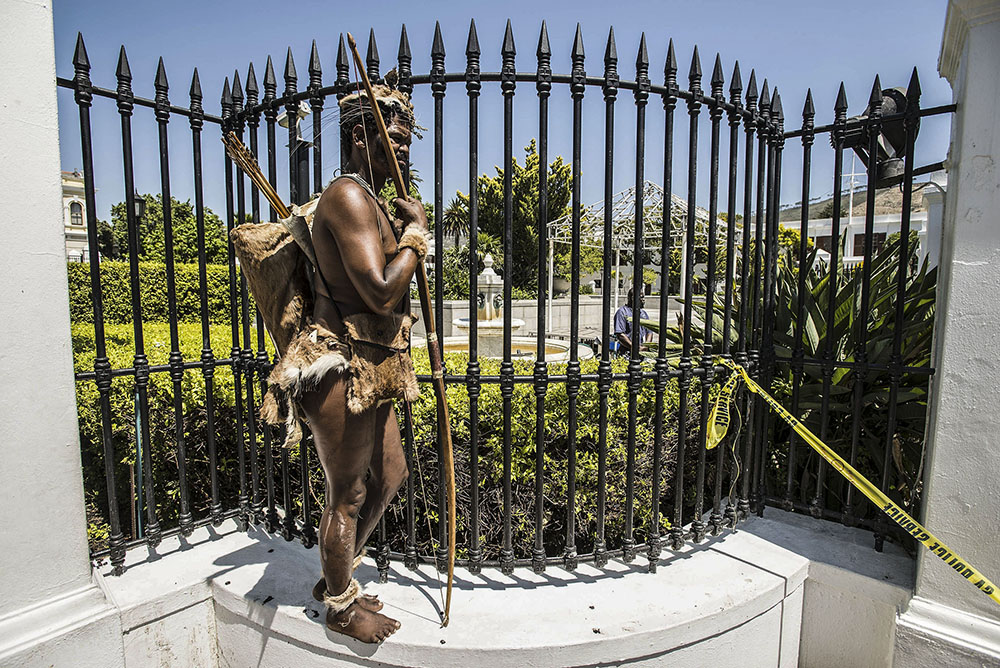Eldorado Park residents illegally occupying vacant land demand houses from government at a protest outside the Johannesburg high court on May 12 2015.
The coloured people’s rights group, Camissa Movement for Equality, has called on the United Nations Human Rights Council (UNHRC) to recognise the “systematic discrimination against coloured people” and force the South African government to set up a system to monitor their underdevelopment.
The argument was delivered through the United States-based civil society group, Advocates for Human Rights, which has partnered with Camissa. It funded Camissa leader Jerome Lottering’s trip to Geneva, Switzerland, last week.
Camissa and the civil society group have identified three broad areas of “systematic” discrimination:
- The affirmative action policy does not benefit coloured people;
- Housing development in coloured areas is being neglected; and
- State media representation is not proportionate to the coloured population.
Regarding affirmative action, the two groups say this policy amounts to discrimination. Their presentation says: “South Africa’s affirmative action legislation, in practice, actually discriminates against coloureds.”
To back the claim, Camissa cites two examples of discriminatory employment policies in government.
In 2013 the Nelson Mandela Bay municipality decided to use national and provincial demographics instead of municipal numbers to set employment targets. This lowered the target for the number of coloured people to be employed to 13% from 23%.
In the Western Cape, the department of correctional services implemented an employment equity plan based on national demographics. This resulted in the department’s employment target for coloured people in the Western Cape being set at 8.8%. The group says this is discriminatory given the large population of coloured people living in the province compared with other provinces.
On housing, Camissa says its surveys are evidence of unfair discrimination. Lottering said in his presentation to the UN delegates that “data shows that coloureds have been disproportionately impacted by the lack of progress”.
In 2016, Lottering said, the organisation surveyed more than 2 000 backyard residents in Eldorado Park, Johannesburg, which has a predominantly coloured population.
“Of the surveyed participants, 89% identified as coloured and 10% as black African. Of those surveyed, 47% (about 1 000) applied for government-subsidised housing; 30% (about 300) did so during the Mandela administration from 1994 to 1999 and 40% (about 400) during the Mbeki administration between 1999 and 2008,” said Lottering.
“The denial of equal access to state-funded media for coloured people violates the Right to Freedom of Expression under Article 19(2) of the International Covenant on Civil and Political Rights,” the Advocates for Human Rights said at the UNHRC.
The civil society group and Lottering propose a system to keep track of the lack of development in coloured communities, specifically with regard to unemployment and housing.
The collaboration with Advocates for Human Rights is meant to compel delegates from UN member countries to acknowledge the discrimination and support Camissa’s proposals during the UN’s Universal Periodic Review (UPR) on South Africa, due next month. The UPR is a peer review of the country’s human rights record, created in 2006 and conducted by 193 countries.
Lottering established Camissa in September 2014. He describes the organisation as a pro-coloured and indigenous people’s organisation. It is named after the indigenous Khoena people’s description of the sweet drinking water around Table Mountain in the 16th century.
Camissa, he says, has members across the country but principally relies on more than 3 000 mandate forms signed by disadvantaged coloured people.
Lottering said last week that the trip was not meant to sow seeds of division among people of colour, but “there can’t be social cohesion without economic development and empowerment for coloured people”.

Members of the Khoi San Revolution protest outside Parliament in February 2016 to raise awareness about the plight of their overlooked communities. (David Harrison, Gallo)
The group is supported by District Six activist Patric Tariq Mellet, former Western Cape premier and apartheid tricameral parliament member Peter Marais and representatives of the Khoi, San, Khoena, Nama, Griqua and Cape Malay, some of whom have demanded recognition as the first people of Southern Africa from President Jacob Zuma.
The discrimination against these groups is systematic, said Lottering, and breaks a promise made by Nelson Mandela.
“It’s systemic, meaning [discrimination] is perpetuated through the laws. Mandela’s promise [of a rainbow nation] to coloured people … has been broken and the current ANC government is marginalising this community,” he added.
In South Africa’s previous review, in May 2012, countries such as Mexico, Norway, Switzerland, the US, Austria and Belgium raised concerns about sexual and gender discrimination against women and the lesbian, gay, bisexual, transgender and intersex community.
This time, Camissa and the Advocates for Human Rights want the discrimination of coloured people and other minority groups to receive prominence during the review.
The civil society group decided to partner with Camissa because “South African laws, although they may be good or neutral, in practice result in discrimination against the coloured community. Jerome Lottering is a highly effective human rights advocate”, said spokesperson Jennifer Prestholdt.
The government said there is nothing special about Camissa’s presentation to the UNHRC; it mirrors similar lobbying efforts by groups such as white interest group AfriForum.
“The organisations are also not able to make outlandish claims because most of the member countries have direct relationships with the South African government and are able to check those claims through their embassies,” said department of international relations and co-operation spokesperson Clayson Monyela.